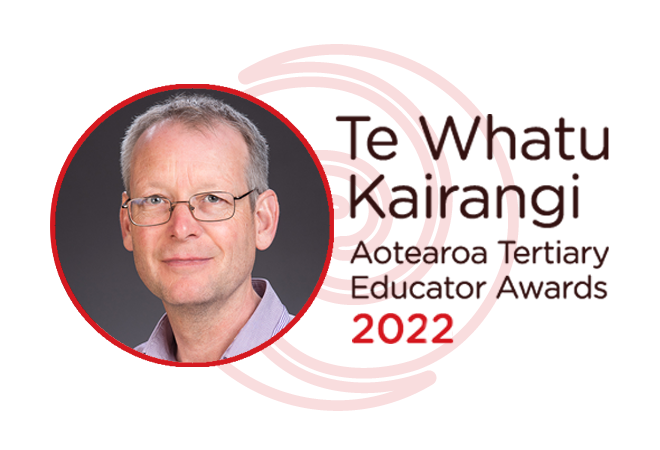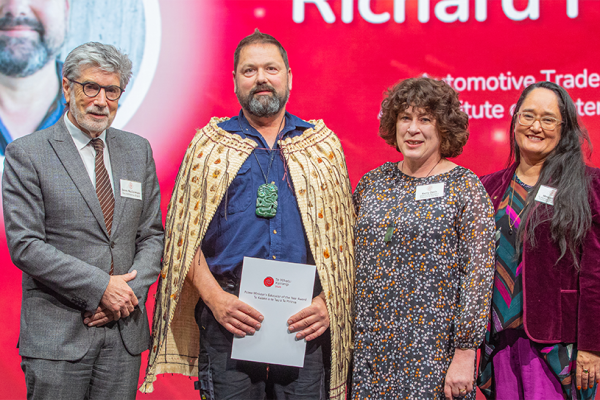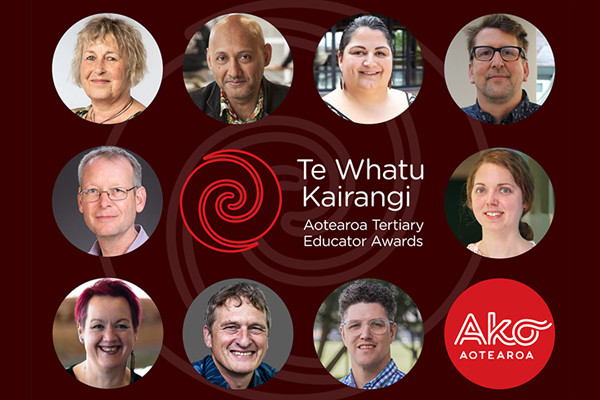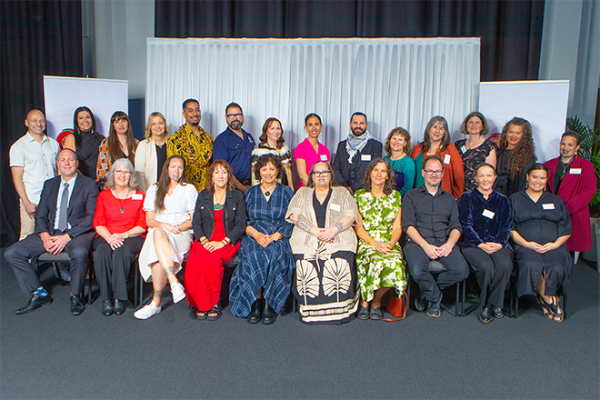David Cox
Excelling at the teaching job he loves
Category winner | Innovation in learning, teaching, and curriculum
Lecturer, Mathematics and Statistics | Te Herenga Waka | Victoria University Wellington
Watch David Cox's Teaching profile video
“I was able to turn around an often-disliked and underperforming course taken by many of our tauira at Te Herenga Waka—Victoria University of Wellington. In 2014 it was decided that STAT193, a ‘service course’ teaching introductory statistical methods to approximately 1,300 students per year over all three trimesters, needed a total overhaul.”
David recognises that many students find Statistics difficult and are ‘scared of’ or ‘hate’ the subject. At his university, the course had a poor reputation with students and was not well-aligned with NCEA Statistics. It took too long to cover simple material taught in Levels 1 and 2, required extensive use of formulae, and involved tiresome data entry into calculators. Computers and spreadsheets were not used at all, meaning that analysis of large datasets was out of the question. Pass rates had at times been lower than 65% and, as one of the largest courses at the university, STAT193 had a heavy marking burden for all Statistics staff at test and exam time. However, passing STAT193 is a prerequisite for studying Psychology, Biology, Criminology, Health and other disciplines. In 2015, David was employed to completely redesign STAT193, to be implemented in Trimester 1 2017. His primary role remains teaching, coordinating, and developing STAT193.
David’s approach has been to actively identify and reduce barriers for all ākonga and to support them to achieve successful education outcomes. His inclusive practices have improved outcomes for Māori and Pasifika ākonga, in particular, and made transitions as seamless as possible. STAT193 attracts a diverse range of ethnicities, nationalities, genders and religious beliefs, as well as students with physical disabilities or those experiencing heightened levels of anxiety, stress, and depression. The course involves several transitions – from high school to university, from the study of a compulsory Applied Statistics course to it becoming a valuable and appreciated tool to be used in students’ chosen disciplines, and from 100-level Statistics to higher level Statistics/Data Science courses. After identifying gaps in the department’s teaching capability, David employed two Research Assistants, one of whom was an outstanding Māori student, to research data and create resources to strengthen teaching, leadership, and learning support.
As course coordinator for STAT193, David considers the needs of all his students when building the assessment structure and design of the course. He works closely with central support teams such as Āwhina, Pasifika Student Success, Disability Services, Student Learning, and Mauri Ora to accommodate different needs. He is flexible with the criteria for giving extensions so that students can attend tangihanga in different parts of the country, is sensitive to and accommodating of students experiencing anxiety, and finds considerate and mature tutors to work with, for example, visually impaired students. He puts a strong emphasis on the improvement of core maths skills in the first two online quizzes and provides continued support through resources such as Practice Maths Tests and tutorial exercises. During lectures, he encourages students to engage in problem-solving and discussion with neighbours and finds that his lively and interactive lecture style increases students’ participation and confidence. He holds the value of manaakitanga very dear and achieves this by, for instance, replacing any negative statistics regarding Māori and Pasifika with more positive and culturally affirming examples, explaining potentially challenging concepts in language that students can relate to, and encouraging student participation in the classroom and on Zoom.
David is constantly aware of the need to engage the interest of students who did not enjoy Statistics at school, as well as those who are keen to see what new insights university-level Statistics will give them. He believes the transition from NCEA to university should be smooth, while not excluding those students without previous experience in Statistics. He presents material covered in NCEA in a way that relates to university studies without it feeling like simple repetition to more experienced students. Early on, he shows the usefulness of tools such as descriptive statistics, creation of graphical displays, informal inference, and probability statements. He finds this ‘grabs’ the students and differentiates the subjects from school Statistics. As David finds it crucial to seek and respond to feedback from students and colleagues, he cocreated a student focus group that was diverse in ethnicity and age to evaluate successes and find areas for improvement after the first roll-out of the redesigned STAT193. Many of the group’s suggestions were implemented. Since David’s redesign of the under-performing STAT193, students report that they feel more confident in their overall numeracy, his colleagues have been able to replicate and implement his successful innovations, and pass rates have generally increased. Total numbers of STAT193 students are increasing overall, with Māori and Pasifika enrolments slightly ahead of this increasing trend. The redesign has reduced colleagues’ burden of exam marking by approximately 65%.
David has been at the forefront of course development within the School of Mathematics and Statistics (SMS) and within its sister school of Engineering and Computer Science (ECS). In 2017, he made STAT193 the first course within the schools to introduce online quizzes and tests with questions randomly chosen from large pools. In 2018, he made STAT193 one of the first to introduce online assignment submission and return of feedback. And, in 2020, he was an early adopter of the fit-for-purpose ECS assessment system for assignment marking and annotation to replace the cumbersome Blackboard system. These innovations have all been widely followed by his colleagues.
Collaboration with his colleagues in the current teaching and assessment landscape has prompted further developments. During 2020, David created a fit-for-purpose final test in STAT193 in response to the university no longer holding invigilated exams due to COVID-19. At the end of the year, the test was re-designed and improved. Achieving alignment with, and continuity from, NCEA Levels 1-3 to university in as seamless a way as possible has been greatly assisted by David’s long experience as a private tutor and relief high school teacher of Calculus and Statistics in Christchurch from 1993-2015, as well as by his work as tutor and contract lecturer at University of Canterbury from 2013-2015. He has led and worked collaboratively on such programmes as: MATH/STAT Challenge days and Scholarship Statistics and Calculus workshops at VUW; Teacher of Scholarship classes at Wellington Girls’ College; Moderator for Statistics, Quantitative Methods and Calculus courses for UP Education; Materials Critiquer for NZQA Scholarship Statistics since 2020; and co-author with David Barton of Essential Maths and Stats for Higher Education, published in 2013. He has undertaken numerous speaking engagements and is an active member of many committees. Recent recognition of his leadership includes promotion to the Teaching Intensive Pathway as Lecturer (Teaching) in 2021 and a THW-VUW Teaching Excellence Award in 2021.
“We cannot hope to win everyone over to a keen interest in Statistics, but my approach has been motivated by my desire to make the course more relevant, interesting, useful, and enjoyable to students who may resent having to study Statistics, as well as to engage those students who may have been put off the subject during their studies at school.”



